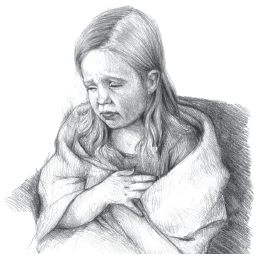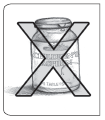Medical Conditions
Flu, The
Print, Share, or View Spanish version of this article
 The flu (influenza) is an illness caused by a virus. It affects the whole body. This is not the same as what we often call the “stomach flu.”
The flu (influenza) is an illness caused by a virus. It affects the whole body. This is not the same as what we often call the “stomach flu.”
Flu season is mostly in the winter. Each year the flu is a little different because there are different types of flu viruses and they change over time. So, people can get the flu many times in their life.
Signs of the Flu
The flu can last a week or more. Your child usually will feel the worst during the first 2 or 3 days. Flu symptoms include:
-
A sudden fever (usually over 101°F or 38.3°C).
-
Chills and shakes with the fever.
-
Headache, body aches, and extreme tiredness.
-
Sore throat and/or dry, hacking cough.
-
Stuffy, runny nose.
-
Throwing up (vomiting) and loose, runny stools (diarrhea).
Is It the Flu or a Cold?
Both the flu and colds are caused by viruses. They can have some of the same symptoms. But there are differences:
Flu
-
Children get sick quickly, often within 1 day.
-
Children usually feel very sick and achy.
-
Most children will need to stay in bed for a few days.
-
Flu is more common in the winter.
Cold
-
Children usually have low fever or none at all.
-
Coughing is mild.
-
Children with colds usually have the energy to play and keep up with their routines.
-
Colds can happen any time of year.
What to Do for the Flu
Call the Doctor…
-
Right away—if your baby is 2 months or younger and has a fever.
-
Within 24 hours—if your child is older than 1 year and shows signs of flu. The doctor may be able to treat the flu with an antiviral drug
* . But this only works if your child gets the drug in the first day or two of illness.
Usually there are no serious problems with the flu. But sometimes your child can get an ear infection, a sinus infection
At
-
Trouble breathing
-
A cough that won’t go away after a week
-
Pain in the ear
-
Fever that continues or comes back after 3 to 4 days
-
Does not start to feel better after a few days
Other Tips
Extra rest and lots of fluids can help your child feel better. You can also give your child medicine to bring down the fever:
-
For a baby 6 months or younger, give acetaminophen
* . -
For a child older than 6 months, give
either acetaminophen or ibuprofen* .
Both of these drugs help with fever. They are not the same. Be sure to get the right kind of medicine for your child’s age. Follow what the label says.
 Never give your child aspirin. Aspirin puts your child at risk for Reye syndrome, a serious illness that affects the liver and brain.
Never give your child aspirin. Aspirin puts your child at risk for Reye syndrome, a serious illness that affects the liver and brain.
Check with your child’s doctor before giving your child any
Don’t smoke around your child. Smoke makes children cough and wheeze
How to Prevent the Flu
The flu spreads very easily, especially to children and adults who spend time with children. It usually spreads during the first several days of the illness.
There are 3 ways to prevent the flu:
Good Hygiene (HYE-jeen)
Keeping germs from spreading is the best way to avoid spreading the flu. These tips will help protect your family from getting sick:
-
Teach your child to cover his or her mouth and nose when coughing or sneezing. Show your child how to use a tissue or a sleeve, not a hand.
-
Use tissues for runny noses. Throw them in the trash right away.
-
Avoid kissing a sick child on the mouth or face.
-
Make sure everyone washes their hands often.
-
Wash dishes, spoons, and forks in hot, soapy water or the dishwasher.
-
Don’t let children share pacifiers, cups, spoons, forks, washcloths, or towels.
Never share toothbrushes. -
Use paper cups in the bathroom and kitchen. Throw them away after each use.
-
Wash doorknobs, toilet handles, countertops, and even toys. Use a disinfectant
* or soap and hot water.
Flu Vaccines
There are safe vaccines to protect against the flu. They come as shots and a nose spray. Ask your child’s doctor what is best for your child. Most healthy children need a flu vaccine every fall. All their family members should get the vaccine too. Call the doctor in September to find out more.
Antiviral Drugs
These drugs are taken before the child is exposed to the flu. These are very important for children with serious health problems who have not had a flu vaccine.



